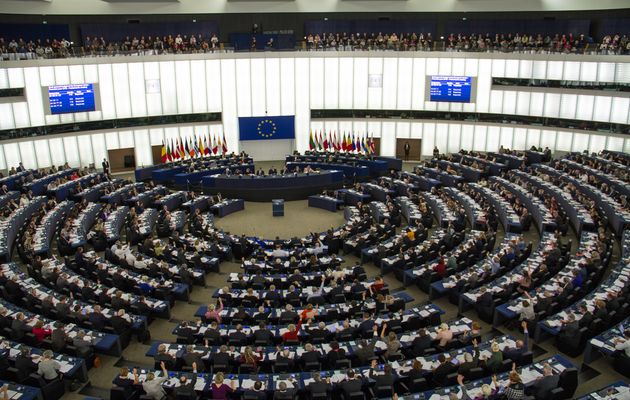Christian persecution is happening in Europe - The European Parliament is asked to act on it
The Observatory on Intolerance and Discrimination against Christians in Europe has collected over 2200 cases since 2006.
20 JUNE 2018 · 13:00 CET

“We get to talk about [intolerance against Christians] around the world, not paying any attention to the fact that on our own doorsteps and on our own streets, there is christianophobia and intolerance…. We need to start saying: No. Enough is enough. We do not have to face this any longer”.
These were the introductory statements of Nathan Gill, MEP, who recently hosted a panel discussion in the European Parliament on intolerance against Christians in Europe.
Several international experts, lawyers, and leaders of religious freedom organisations spoke on the topic.
Gill emphasized that if Europe neglects its heritage of religious liberty, then it is ignoring the sacrifices of its ancestors, who have worked and fought in order to “give us a Europe of freedom and a Europe of democracy.”
Hendrik Storm, Chief Executive Officer of Barnabas Fund also pointed out the importance of fundamental freedoms in Europe, with religious freedom being among them: “You can’t pick and choose the types of freedom you want to defend: freedom of speech, freedom of the press, academic freedom or freedom of religion.
You must defend them all. They are closely associated with one another. He went on and sounded the alarm: “These freedoms are only a generation away from being lost…. We increasingly see the erosion of freedom of religion in Europe.”
Evidence of Christian persecution in Europe
Ellen Fantini, from the Observatory on Intolerance and Discrimination against Christians in Europe pointed out clear evidence that Christian persecution is happening in Europe.
The organization she represents has collected over 2200 cases of intolerance or discrimination against Christians in Europe since 2006. The Observatory’s 2018 Report provides over 500 such cases from 2016 and 2017.
Fantini said the report “demonstrates that the situation for Christians covers a broad range of marginalisation and hostilities that we can't find acceptable in Europe”.
Fantini gave examples where freedom of speech, freedom of conscience and parental rights of Christians in Europe were not respected despite the EU’s very clear regulations protecting them.
A notable example of the above is the case of the Ellinor Grimmark, a Christian midwife in Sweden who had to find work outside of Sweden because she refused to participate in abortions. The right to conscientious objection in the medical profession is not recognized in Sweden.
In German universities there is an increasingly anti-religious climate. Dozen of cases of discrimination against religious groups (including Christian) ran by students have been documented by the German Student Mission.
These religious groups were denied the use of campus facilities, the accreditation by student councils, and were prohibited from handing out flyers.
The British Pharmaceutical Council published in 2017 new professional standards that state, in some circumstances, pharmacists were expected to dispense a drug against his or her conscience. This means that a pharmacist who does not wish to issue an abortifacient drug cannot refer the patient to another colleague in some circumstances.
A detailed analysis of many more other cases of discrimination against Christians can be found in the Observatory’s online report.
Moreover, Wilson Chowdry of the British Pakistani Christians Association noted that there is ongoing persecution in Europe against Christian refugees and Christian Europeans who convert from Islam. The case of Nissar Hussain is a striking example.
Hussain, a British citizen and convert to Christianity from Islam, described the persecution that he and his family have gone through for the last 15 years. They endured numerous physical assaults, vandalism, abuse, and threats in the UK. The police and local authorities took very little, if any, action.
Freedom of religion must constantly be defended
“We increasingly see the erosion of religious freedom in Europe. It is easy to sit back and ignore the damage”, stated Hendrik Storm. “Like erosion, it is not immediately visible on the surface, but if we dig in deeper, we can see the cracks appear.”
Religious freedom must not be taken for granted. It must constantly be reaffirmed and defended both by politicians and civil society. We cannot afford, both for ourselves and for the generations to come, to lose a precious freedom that affects all aspects of our lives and enriches our societies.
“No nation stands alone in the persecution of Christianity. …We must unite and stand up for our beliefs and our rights. We must defend each other with these rights. Where people are being persecuted, we need to be that voice for those people who cannot speak up”, concluded Nathan Gill.
Roxana Stanciu, Executive Director of European Dignity Watch, based in Brussels. Learn more about how this organisation informs, educates, and equips stakeholders in Europe to make a difference in public life, defending freedom, family, and life; visit EDW's website.
Published in: Evangelical Focus - European Dignity Watch - Christian persecution is happening in Europe - The European Parliament is asked to act on it
